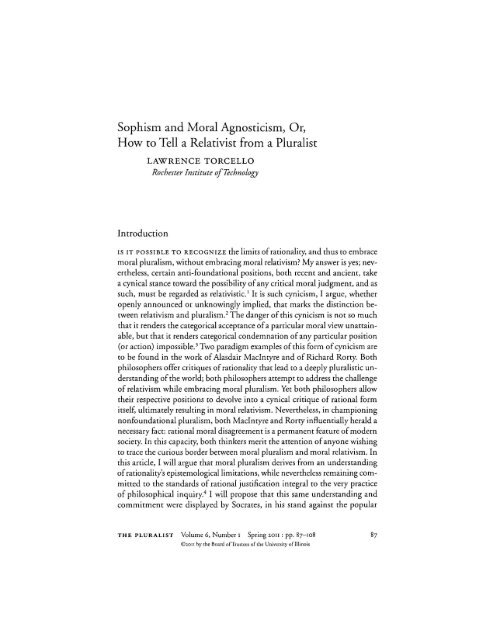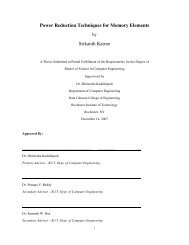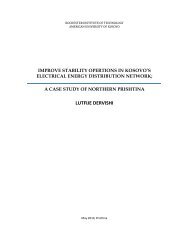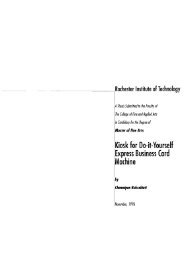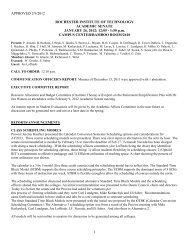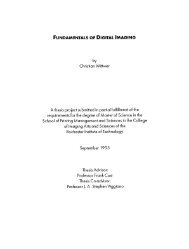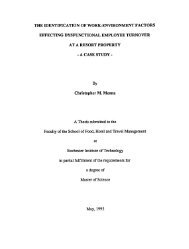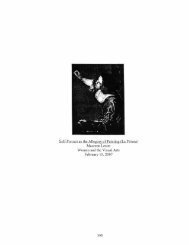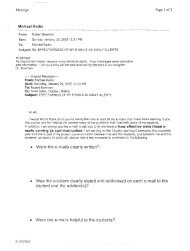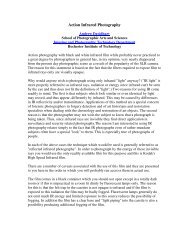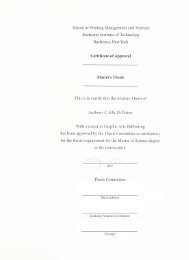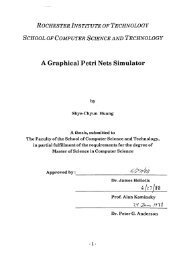Sophism and Moral Agnosticism, Or, How to Tell a Relativist from a ...
Sophism and Moral Agnosticism, Or, How to Tell a Relativist from a ...
Sophism and Moral Agnosticism, Or, How to Tell a Relativist from a ...
Create successful ePaper yourself
Turn your PDF publications into a flip-book with our unique Google optimized e-Paper software.
<strong>Sophism</strong> <strong>and</strong> <strong>Moral</strong> <strong>Agnosticism</strong>, <strong>Or</strong>,<br />
<strong>How</strong> <strong>to</strong> <strong>Tell</strong> a <strong>Relativist</strong> <strong>from</strong> a Pluralist<br />
Introduction<br />
LAWRENCE TORCELLO<br />
Rochester Institute o/Technology<br />
IS IT POSSIBLE TO RECOGNIZE the limits ofrationality, <strong>and</strong> thus <strong>to</strong> embrace<br />
moral pluralism, without embracing moral relativism? My answer is yes; nevertheless,<br />
certain anti-foundational positions, both recent <strong>and</strong> ancient, take<br />
a cynical stance <strong>to</strong>ward the possibility ofany critical moral judgment, <strong>and</strong> as<br />
such, must be regarded as relativistic. I It is such cynicism, I argue, whether<br />
openly announced or unknowingly implied, that marks the distinction between<br />
relativism <strong>and</strong> pluralism. 2 The danger ofthis cynicism is not so much<br />
that it renders the categorical acceptance ofa particular moral view unattainable,<br />
but that it renders categorical condemnation ofany particular position<br />
(or action) impossible. 3 Two paradigm examples ofthis form ofcynicism are<br />
<strong>to</strong> be found in the work ofAlasdair MacIntyre <strong>and</strong> of Richard Rorty. Both<br />
philosophers offer critiques ofrationality that lead <strong>to</strong> a deeply pluralistic underst<strong>and</strong>ing<br />
ofthe world; both philosophers attempt <strong>to</strong> address the challenge<br />
of relativism while embracing moral pluralism. Yet both philosophers allow<br />
their respective positions <strong>to</strong> devolve in<strong>to</strong> a cynical critique of rational form<br />
itself, ultimately resulting in moral relativism. Nevertheless, in championing<br />
nonfoundational pluralism, both MacIntyre <strong>and</strong> Rorty influentially herald a<br />
necessary fact: rational moral disagreement is a permanent feature ofmodern<br />
society. In this capacity, both thinkers merit the attention ofanyone wishing<br />
<strong>to</strong> trace the curious border between moral pluralism <strong>and</strong> moral relativism. In<br />
this article, I will argue that moral pluralism derives <strong>from</strong> an underst<strong>and</strong>ing<br />
ofrationality's epistemological limitations, while nevertheless remaining committed<br />
<strong>to</strong> the st<strong>and</strong>ards of rational justification integral <strong>to</strong> the very practice<br />
of philosophical inquiry.4 I will propose that this same underst<strong>and</strong>ing <strong>and</strong><br />
commitment were displayed by Socrates, in his st<strong>and</strong> against the popular<br />
THE PLURALIST Volume 6. Number I Spring 20II : pp. 87-108<br />
©lO1l by clle Board ofTrustees of ,be University ofIllinois
88 THE PLURALIST 6: I 2011<br />
sophistical relativism of his own time. I maintain there is a distinction (0 be<br />
made between justification <strong>and</strong> judgment; such a distinction, I will argue,<br />
allows us (0 condemn certain moral claims decisively, even ifwe are otherwise<br />
unable <strong>to</strong> justify our comprehensive claims in a non-circular fashion.<br />
More specifically, given the reality ofpluralism, it is necessary <strong>to</strong> identify<br />
exactly what is at stake in moral relativism <strong>and</strong> its relationship <strong>to</strong> pluralism.<br />
Consider, for example, a clash between two distinctive moral doctrines:<br />
one doctrine commends the enslavement of a foreign group. For the sake<br />
of argument, let us assume that this first sect takes a literal interpretation<br />
of the following passage <strong>from</strong> the Judea-Christian Book ofLeviticus: "Your<br />
male <strong>and</strong> female slaves are <strong>to</strong> come <strong>from</strong> the nations around you; <strong>from</strong> them<br />
you may buy slaves" (25.44). Assume the tradition in question interprets<br />
this passage in a coherently rational manner consistent with the tradition's<br />
metaphysical first principles. Now consider a second, competing point of<br />
view, which holds categorically that slavery is wrong. Perhaps the adherents<br />
of this doctrine take a literal interpretation of the following verse <strong>from</strong> the<br />
Christian Epistle <strong>to</strong> the Galatians: "There is neither Jew nor Greek, there<br />
is neither slave nor free, there is no male <strong>and</strong> female, for you are all one in<br />
Christ Jesus" (3.28). Assume this latter tradition interprets this biblical passage<br />
in an equally consistent <strong>and</strong> rational manner regarding its metaphysical<br />
first principles. Ifone cannot provide a non-circular argument as <strong>to</strong> why one<br />
of these positions is condemnable in contrast <strong>to</strong> the other, then one runs<br />
the risk of relativism.<br />
If reason cannot adjudicate against specific behaviors (such as enslavement),<br />
then force remains the natural arbitra<strong>to</strong>r of values. Such is the real<br />
danger <strong>and</strong> challenge of relativism. Thus it is not a question ofwhether one<br />
position is non-circularly justifiable over the other, for any number ofincommensurable<br />
moral viewpoints may be justifiable in terms ofrational coherence<br />
following <strong>from</strong> specific first principles (on the contrary, as I will show below,<br />
this is simply the reality of moral pluralism). The abiding danger of relativism,<br />
as opposed <strong>to</strong> pluralism, is that competing moral views may equally defy<br />
attempts at categorical condemnation. In other words, pluralism lies in the inability<br />
<strong>to</strong> defend any position categorically; whereas relativism, I will maintain,<br />
lies in the inability <strong>to</strong> condemn any position categorically. Moreover, using this<br />
crucial difference as a wedge, I contend, contra both MacIntyre <strong>and</strong> Rorty, that<br />
philosophical criticism is itselfinherencly pluralistic, <strong>and</strong> as such, provides an<br />
important corrective <strong>to</strong> cynical relativism. After examining MacIntyre's critique<br />
of modern ethics <strong>and</strong> Rorty's "ironic" strategy for avoiding relativism, I will<br />
argue that skeptically nuanced attention <strong>to</strong> the Western canon provides those
TORCELLO : <strong>Sophism</strong> <strong>and</strong> <strong>Moral</strong> <strong>Agnosticism</strong><br />
of us who share Rorty's liberal hope, as well as the challenge ofthe relativism<br />
he unsuccessfully faces, with a theoretically legitimate alternative <strong>to</strong> Rorty's<br />
irony. I identifY "moral agnosticism" as a means of drawing attention <strong>to</strong> an<br />
ethical stance transcendental <strong>to</strong> rational philosophical discourse itself, <strong>and</strong><br />
essential <strong>to</strong> underst<strong>and</strong>ing the distinction between pluralism <strong>and</strong> relativism,<br />
<strong>and</strong> <strong>to</strong> adjudicating based on that distinction.<br />
Part One: MacIntyre's Skepticism<br />
Alasdair MacIntyre provides a skeptical critique ofmodern morality that reveals<br />
that the prospect of universally justifYing a rational moral tradition is<br />
hopelessly untenable, due <strong>to</strong> limitations inherent <strong>to</strong> rationality itself5 Such<br />
limitations ensure that all moral claims will be either circular in nature, or<br />
party <strong>to</strong> an infinite regress of moral justification. Nevertheless, MacIntyre<br />
suggests that one can discern a means by which <strong>to</strong> judge various rational<br />
traditions, by measuring how well any given tradition is able <strong>to</strong> sustain coherency<br />
in the face ofepistemic challenges brought against it. Consequently,<br />
MacIntyre claims <strong>to</strong> escape the threat of relativism. So far, so good for MacIntyre,<br />
but he does not s<strong>to</strong>p with this skeptical critique. Instead, MacIntyre<br />
continues <strong>to</strong> question the normative st<strong>and</strong>ard of rationality itself<br />
As MacIntyre has it, a vital objective ofthe Enlightenment was <strong>to</strong> provide<br />
for the deliberation ofmorality in the public sphere by instituting st<strong>and</strong>ards of<br />
rationaljustification, by which a plethora of particular, even atypical actions<br />
could be justly <strong>and</strong> universally judged (Whose justice? 6). One ofthe reasons<br />
that the Enlightenment project has failed, according <strong>to</strong> MacIntyre, is that it<br />
bequeathed us a misguided view ofwhat counts as rational justification in the<br />
first place. The litmus test for such justification, according <strong>to</strong> Enlightenment<br />
thinkers, would be that rational beings would accept such a justification qua<br />
rational beings: its character would be evidential. Yet for MacIntyre, the acceptance<br />
of any rational justification is itself entrenched in circularity. The<br />
Enlightenment approach, that is, is one tradition among many. We choose<br />
it, ifwe do, for the same (contingent, aesthetic) ultimately groundless reasons<br />
that we choose the authority ofany tradition.<br />
In fact, MacIntyre sees the tradition of Enlightenment philosophy <strong>and</strong><br />
morality as particularly dogmatic. According <strong>to</strong> him, post-Enlightenment<br />
modernity has inherited a false dilemma, by which we believe that we must<br />
either uncover a universal morality comprehensible <strong>to</strong> all rational beings,<br />
or else we have failed entirely in our moral pursuits <strong>and</strong> will slide in<strong>to</strong> the<br />
default position of moral relativism. As a rejoinder <strong>to</strong> this false dilemma,
9° THE PLURALIST 6: I 20II<br />
Macintyre formulates the "relativist challenge": faced with competing claims<br />
ofrival traditions, the unprejudiced judge will soon find that each tradition<br />
has its own st<strong>and</strong>ards of rationality or "background beliefs." Appealing <strong>to</strong><br />
any of these st<strong>and</strong>ards entails the assumption ofthe st<strong>and</strong>point of the tradition<br />
in which they are expressed. Yet we need not assume such a st<strong>and</strong>point,<br />
<strong>and</strong> if we do not, then we can find no good reason <strong>to</strong> prefer one tradition<br />
<strong>to</strong> any other. Rational, propositional claims may be issued according <strong>to</strong> the<br />
background beliefs ofa particular tradition, bur they cannot be shown <strong>to</strong> be<br />
rational as such. MacIntyre concludes: "Every set of st<strong>and</strong>ards, every tradition<br />
incorporating a set of st<strong>and</strong>ards, has as much <strong>and</strong> as little claim <strong>to</strong> our<br />
allegiance as any other. Let us call this the relativist challenge. "6<br />
After thus critiquing the Enlightenment notion ofrational justification,<br />
MacIntyre hopes <strong>to</strong> offer another approach-one he believes overcomes the<br />
relativist challenge. He endeavors <strong>to</strong> propose a way in which rival traditions<br />
can be evaluated without appealing <strong>to</strong> any normative measure ofrational justification.<br />
So, MacIntyre proposes that we begin by identifying the endemic<br />
features ofany tradition <strong>and</strong> that we examine its structural presuppositions.<br />
Though these structural presuppositions are not intrinsically bound <strong>to</strong> any<br />
particular tradition, MacIntyre holds that they afford the opportunity <strong>to</strong><br />
measure how well the structure maintains its integrity over time <strong>and</strong> against<br />
epistemic challenges. MacIntyre holds that beliefs, institutions, <strong>and</strong> communal<br />
practices are always in a state of relative change, but he means <strong>to</strong> put<br />
this changefulness <strong>to</strong> work <strong>to</strong> answer the charge of relativism.<br />
Macintyre explains that a given tradition may develop in a number of<br />
ways, one of which is in relation <strong>to</strong> the founding texts <strong>and</strong> authorities of<br />
the tradition itself. A text or an oral his<strong>to</strong>ry can be challenged, <strong>and</strong> interpretations<br />
of it can be debated. MacIntyre also argues that incoherence <strong>and</strong><br />
inconsistency in a given traditional set of beliefs can become evident over<br />
time. New situations <strong>and</strong> dem<strong>and</strong>s may emerge environmentally, for example,<br />
<strong>and</strong> contact with other traditions may give rise <strong>to</strong> new sets ofproblems <strong>and</strong><br />
questions. Those in challenged traditions are then forced <strong>to</strong> address new developments,<br />
should they wish <strong>to</strong> avoid a crisis in their tradition. In part, the<br />
way that challenges <strong>to</strong> a given tradition are addressed will be the product of<br />
the analytical <strong>to</strong>ols native <strong>to</strong> that tradition. Likewise, the response <strong>to</strong> these<br />
inevitable challenges will determine how traditions develop or disintegrate.<br />
Imagine a tradition tbat wants <strong>to</strong> incorporate in<strong>to</strong> its fold both passages<br />
quoted earlier <strong>from</strong> the Book ofLeviticus <strong>and</strong> the Epistle <strong>to</strong> the Galatians, as<br />
a tradition dealing with such an epistemological challenge.<br />
In some cases, certain belief> will need <strong>to</strong> be rejected for the sake ofgreater
TORCELLO : <strong>Sophism</strong> <strong>and</strong> <strong>Moral</strong> <strong>Agnosticism</strong><br />
coherency; in others, a new authority strucmre may emerge. A reordering of<br />
the relative importance oftexts may be in order, or new texts may need <strong>to</strong> be<br />
added <strong>to</strong> a canon. These changes deeply affect a given culture's cus<strong>to</strong>ms <strong>and</strong><br />
behavior patterns, <strong>from</strong> their marriage cus<strong>to</strong>ms <strong>to</strong> their clothing. At later stages<br />
ofdevelopment, members ofa tradition who accept the newest incarnation of<br />
the tradition are able <strong>to</strong> contrast the old belief systems with that of the new.<br />
The incongruence between the views <strong>to</strong> which they once adhered <strong>and</strong> their<br />
new beliefs can be surveyed <strong>from</strong> what is perceived <strong>to</strong> be a better vantage<br />
poim, <strong>and</strong> <strong>from</strong> the new point of view, members may judge the previous<br />
underst<strong>and</strong>ing of reality <strong>to</strong> be false. According <strong>to</strong> MacIntyre, a tradition that<br />
is capable of underst<strong>and</strong>ing a previous tradition, <strong>and</strong> is better able <strong>to</strong> h<strong>and</strong>le<br />
its epistemic challenges, must be judged superior. When a puzzle arises that<br />
is not readily solvable with the conceptual resources ofa given tradition, an<br />
epistemological crisis may ensue. Revolutionary shifts develop when moral<br />
traditions allow for explana<strong>to</strong>ry crises that they do not have the resources <strong>to</strong><br />
solve-crises that new moral traditions can address compellingly.<br />
We know that for Macintyre, a given tradition can assert that a particular<br />
statement is true within its own domain. <strong>How</strong>ever, MacIntyre also argues that<br />
at any given time, a tradition is at risk ofentering a state ofepistemological<br />
crisis. Ifthe tradition cannot adapt itselfin order <strong>to</strong> meet the challenges ofthe<br />
crisis, then that tradition itself may be in jeopardy ofsacrificing a legitimate<br />
claim <strong>to</strong> truth. A moral tradition that cannot survive an epistemological crisis<br />
can count on being replaced. Likewise, a tradition that can cope with epistemological<br />
crises shows itself <strong>to</strong> be a stronger, more justifiable tradition, with<br />
more coherent claims <strong>to</strong> truth. MacIntyre explains that successfully passing<br />
through an epistemological crisis enables the advocates ofa given tradition<br />
a certain his<strong>to</strong>rical sense-even a sort of his<strong>to</strong>rical savvy.<br />
Survival after an explana<strong>to</strong>ry crisis provides the occasion for advocates<br />
<strong>to</strong> identify their tradition's his<strong>to</strong>rical cominuities (as against its apparent<br />
contingencies) <strong>and</strong> hence <strong>to</strong> more sharply distinguish their tradition's internal<br />
structure of justification, or that which "underpins whatever claims<br />
<strong>to</strong> truth are made within it."7 Though any particular claims that a tradition<br />
makes are ascertainable only within certain his<strong>to</strong>rical, linguistic, <strong>and</strong> cultural<br />
circumstances, the notion of truth itself, MacIntyre allows, is timeless. He<br />
concludes:<br />
To claim that some thesis is true is not only <strong>to</strong> claim that for all possible<br />
times <strong>and</strong> places that it cannot be shown <strong>to</strong> fail <strong>to</strong> correspond <strong>to</strong> reality<br />
... but also that the mind which expresses its thought in that thesis is in<br />
fact adequate <strong>to</strong> its object. The implications of this claim made in this
THE PLURALIST 6: I 20II<br />
way <strong>from</strong> within a tradition are precisely what enable us <strong>to</strong> show how<br />
the relativist challenge is misconceived. (Whose Justice? 363-64)<br />
MacIntyre certifies that a claim has "warranted asserrability" insofar as it<br />
remains coherent within the conceptual framework <strong>from</strong> which it is made.<br />
An analysis of MacIntyre's preliminary arguments leads <strong>to</strong> the conclusion<br />
that all he can hope <strong>to</strong> achieve, with any ethical claim, is a meeting of this<br />
criterion ofwarranted asserrability. Yet in the passage just quoted, MacIntyre<br />
seems <strong>to</strong> assert that ifwe recognize the structural nature ofwarranted asserrability<br />
itself, we may transcend mere warranted assertibility <strong>and</strong> hit upon a<br />
deeper domain of truth. MacIntyre indicates that the charge ofrelativism is<br />
misguided precisely because it fails <strong>to</strong> recognize the true, pluralistic nature of<br />
rational justification. It is on just these pluralistic grounds, though, according<br />
<strong>to</strong> MacIntyre, that his own analysis avoids relativism.<br />
Yet how, the skeptical reader still wishes <strong>to</strong> ascertain, can MacIntyre's critique<br />
of rationality <strong>and</strong> its consequences for modern morality validate any<br />
truth-claim that promises <strong>to</strong> adjudicate between traditions? While it is certainly<br />
the case that such judgments must be possible if we are <strong>to</strong> escape moral relativism,<br />
<strong>and</strong> likewise clear that MacIntyre wants <strong>to</strong> be able <strong>to</strong> make such judgments,<br />
MacIntyre's eventual argument for a structural, uadition-independenr<br />
st<strong>and</strong>ard is out ofplace in his otherwise consistent disparagement of universal<br />
(Enlightenment) principles. We know thar MacIntyre stridenrly criticizes rhe<br />
Enlightenment for its aspirations <strong>to</strong> elucidate a means ofrational justification<br />
<strong>to</strong> which everyone could assent (e.g., at Whose Justice? 6). Yet whether or nor<br />
it is apparent <strong>to</strong> MacIntyre, this aspiration is not meaningfully different <strong>from</strong><br />
what he, <strong>to</strong>o, hopes <strong>to</strong> achieve with his own explanation of how <strong>to</strong> judge between<br />
moral tradirions. Again then, MacIntyre's attempts <strong>to</strong> elucidate a st<strong>and</strong>ard<br />
by which <strong>to</strong> judge the rationality of traditions while denying that there is any<br />
tradition-independent st<strong>and</strong>ard ofjustification, or for that matter rationality,<br />
remain questionable. And after all, it is just such a denial that is provocatively<br />
implied in the very questions which form the title of MacIntyre's text (Whose<br />
Justice? Which Rationality?) as well as its key contentions.<br />
Now, the most constructive aspect ofMacIntyre's argument has shown<br />
that within a given tradition, there can be internal debate. Ifat some point,<br />
the tradition fails <strong>to</strong> remain coherent by its own st<strong>and</strong>ards, then that tradition<br />
loses the claims <strong>to</strong> truth that it previously was able <strong>to</strong> make. This seems<br />
<strong>to</strong> rule out only the most general form of individual relarivism. Julia Annas,<br />
in her '989 Philosophy & PubLic Affairs review of MacIntyre's Whose Justice?<br />
Which RationaLity? addresses the issue:
TORCELLO : <strong>Sophism</strong> <strong>and</strong><strong>Moral</strong> <strong>Agnosticism</strong> 93<br />
MacIntyre's ideas need more defense.... [H]e does not argue against<br />
those who would assert that the favored theory's claim <strong>to</strong> superiority of<br />
explanation can do no more than beg the question in favor of its own<br />
claims.... Many may in fact feel a recurrent doubt as <strong>to</strong> whether MacIntyre<br />
succeeds in avoiding relativism, as he claims <strong>to</strong> do. He clearly<br />
avoids various extreme forms of relativism that would make traditions<br />
unintelligible <strong>to</strong> one another by his insistence that traditions rationally<br />
communicate <strong>and</strong> argue with one another.... But, given that he also<br />
insists that rationality itselfis tradition-dependent, is he not committed<br />
<strong>to</strong> a more subtle form ofrelativism about rationality? When he claims,<br />
for example, that the Thomist tradition has been successful in meeting<br />
attacks <strong>from</strong> other traditions, can the claim amount <strong>to</strong> more than that<br />
Thomism considers itself <strong>to</strong> be thus successful? (Annas 393)<br />
With Annas, I argue that the first challenge MacIntyre has failed <strong>to</strong> overcome<br />
is the challenge ofadjudication between competing <strong>and</strong> conflicting traditions.<br />
IfMacIntyre's arguments about the internal justification oftraditions<br />
are taken seriously, then the problem ofadjudication necessarily follows, <strong>and</strong><br />
MacIntyre offers no rejoinder <strong>to</strong> its relativistic consequences.<br />
A second objection <strong>to</strong> MacIntyre's position is still more damaging, for it<br />
reveals that MacIntyre's position is self-refuting. MacIntyre cannot meaningfully<br />
criticize universal st<strong>and</strong>ards of rational justification without assuming<br />
one. If MacIntyre is not himselfalready operating within a universal st<strong>and</strong>ard<br />
of rational justification, then his charges that modern morality rests upon<br />
emotive contingency <strong>and</strong> circularity will have no force. To argue forcefully,<br />
MacIntyre would have <strong>to</strong> assume a universal st<strong>and</strong>ard ofrational justification.<br />
Likewise, his claim that rational traditions can be weighed against each other,<br />
in the case ofepistemological crises, will have no force unless it depends upon<br />
a rational st<strong>and</strong>ard of justification for its substantiation-which MacIntyre<br />
begins by overtly disallowing.<br />
In order for debate <strong>to</strong> begin <strong>and</strong> flourish between rational traditions, there<br />
must be a sense in which rational justification can be recognized independently<br />
ofanyone tradition. MacIntyre, however, rules this out as a possibility. When<br />
he condemns the notion ofa normative rational justification that is independent<br />
ofa tradition, he necessarily appeals, in the very process, <strong>to</strong> a st<strong>and</strong>ard of<br />
rational justification that transcends every discrete tradition. This appeal <strong>to</strong> a<br />
st<strong>and</strong>ard ofjustification is indeed the only way that MacIntyre can meaningfully<br />
mount any argument of the kind he intends. John Searle speaks <strong>to</strong> JUSt<br />
this point, near the end of his book, The Constmction ofSocial Reality:
94 THE PLURALIST 6: 1 2011<br />
"What is your argument for rationality?"-in that the very posing of<br />
the challenge somehow presupposes what is challenged. Any attempt<br />
<strong>to</strong> provide an "argument" or "proof" already presupposes st<strong>and</strong>ards of<br />
rationality, because the applicability of those st<strong>and</strong>ards is constitutive<br />
ofsomething being an argument or proof. In a word, you can't prove<br />
rationality by argument because arguments already presuppose rationality.<br />
(178)<br />
To Searle's apt observation, I add that just as one cannot argue for rationality<br />
<strong>from</strong> within the framework of rationality, one cannot argue against<br />
rationality <strong>from</strong> within the fioamework of rationality, without refuting one's<br />
own position in the process. s It is MacIntyre's failure <strong>to</strong> recognize this, <strong>and</strong><br />
his embrace, instead, of a peculiar cynicism regarding rationality, which is<br />
at the root of his failure <strong>to</strong> overcome relativism. Of course, one can always<br />
choose <strong>to</strong> ab<strong>and</strong>on rationality, but then the project ofphilosophical inquiry<br />
ceases <strong>and</strong> one enters the realm ofmysticism, faith, or sophistical rhe<strong>to</strong>ric.<br />
Utilizing MacIntyre's t<strong>and</strong>em embrace ofmoral pluralism <strong>and</strong> critique of<br />
categorical st<strong>and</strong>ards ofrationality, how might one broach the divide between<br />
the two moral groups alluded <strong>to</strong> earlier, regarding slavery? Given the case of<br />
two conflicting traditions, where one tradition holds it permissible <strong>to</strong> enslave<br />
the members ofthe other tradition, can MacIntyre adjudicate between them?<br />
It is clear that if neither of the traditions is in an epistemological crisis <strong>and</strong><br />
both traditions are coherently <strong>and</strong> consistently applying principles with regard<br />
<strong>to</strong> their tradition-dependent st<strong>and</strong>ards of rationality, then MacIntyre has no<br />
way ofcondemning one group as opposed <strong>to</strong> the other. The sect seeking <strong>to</strong><br />
be masters is justified in their attempt <strong>to</strong> enslave the group seeking <strong>to</strong> remain<br />
free. The sect that resists slavery is equally justified. We are left with a most<br />
Thrasymachian form of relativism, where the only possible arbitra<strong>to</strong>r ofthis<br />
disagreement can be force.<br />
Skepticism for the sake ofskepticism, or skepticism without aim or means<br />
ofjustification, is best described in the modern world as cynicism. One cannot<br />
doubt rationality in <strong>and</strong> ofitselfbecause the very act ofdoubting, ifmeaningful,<br />
is inherently rationally grounded. Such skepticism, therefore, is vacuous.<br />
It is, by definition, cynicism, <strong>and</strong> in the case of MacIntyre, such cynicism<br />
leads beyond mere pluralism as a condition of free rational inquiry; it leads<br />
MacIntyre <strong>to</strong> relativism. Still, insofar as MacIntyre argues that there are limitations<br />
<strong>to</strong> rational argument that prevent robust moral positions <strong>from</strong> being<br />
categorically justifiable <strong>to</strong> all rational beings qua rational beings, he is correct.<br />
Where MacIntyre embraces a form ofskepticism that leads <strong>to</strong> moral pluralism,<br />
he is not being cynical of rationality but true <strong>to</strong> the very laws ofrationality, as
TORCELLO : <strong>Sophism</strong> <strong>and</strong> <strong>Moral</strong> <strong>Agnosticism</strong> 95<br />
outlined by Aris<strong>to</strong>tle. 9 The mere fact that validity is distinct <strong>from</strong> soundness<br />
implies that rational people can disagree. As I now want <strong>to</strong> show, we must<br />
stick <strong>to</strong> the traditional st<strong>and</strong>ards of rational doubt <strong>and</strong> discourse inherent <strong>to</strong><br />
the philosophical canon in order <strong>to</strong> distinguish reasoned pluralism <strong>from</strong> cynical<br />
relativism.<br />
Part Two: Rorry's Irony<br />
Richard Rorty has said that anti-foundational positions, like his own, share<br />
a perspective often dismissed as relativism:<br />
The epithet "relativist" is applied <strong>to</strong> philosophers who agree with Nietzsche<br />
that "Truth" is the will <strong>to</strong> be master ofthe multiplicity ofsensations.<br />
It is also applied <strong>to</strong> those who agree with William James that "the 'true'<br />
is simply the expedient in the way ofbelieving" <strong>and</strong> <strong>to</strong> those who agree<br />
with Thomas Kuhn that science should not be thought of as moving<br />
coward an accurate representation ofthe way the world is in itself More<br />
generally, philosophers are called "relativists" when they do not accept<br />
the Greek distinction between the way things are in themselves <strong>and</strong> the<br />
relations which they have <strong>to</strong> other things, <strong>and</strong> in particular <strong>to</strong> human<br />
needs <strong>and</strong> interests. (Philosophy <strong>and</strong> Social Hope xvi)<br />
According <strong>to</strong> Rorty, labeling such positions "relativistic" is an empty<br />
rhe<strong>to</strong>rical exercise. Indeed, there are psychological <strong>and</strong> phenomenological<br />
contingencies that serve as epistemic barriers <strong>to</strong> fully objective underst<strong>and</strong>ings<br />
ofreality, so skeptically responsible, nonfoundational positions on robust<br />
ethical <strong>and</strong> metaphysical claims are unfairly labeled as relativistic. I want <strong>to</strong><br />
nevertheless argue that anti-foundational positions involving a characteristic<br />
cynicism <strong>to</strong>ward reason qua reason are <strong>and</strong> should be marked as relativistic,<br />
<strong>and</strong> I will maintain that Rorty's position earns this designation.<br />
Unlike MacIntyre, Rorty is aware ofthe relativistic consequences ofhis<br />
work. As he acknowledges in Contingency, Irony, <strong>and</strong> Solidarity,<br />
I do not think there are any plain moral facts out there in the world,<br />
nor any truths independent of language, nor any neutral ground on<br />
which <strong>to</strong> st<strong>and</strong> <strong>and</strong> argue that either <strong>to</strong>rture or kindness are preferable<br />
<strong>to</strong> the other. (173)<br />
True <strong>to</strong> his philosophy, Rorey does not attempt <strong>to</strong> argue head-on against accusations<br />
of relativism. His strategy, consistent with his critique of rational<br />
discourse, is <strong>to</strong> reframe the rhe<strong>to</strong>ric ofphilosophical speech. This is what leads<br />
Rorty <strong>to</strong> shift his attention <strong>from</strong> logical argument, which he associates with
THE PLURALIST 6: I 20II<br />
the metaphysical tradition ofPla<strong>to</strong>, <strong>to</strong> rhe<strong>to</strong>rical "vocabularies." In Philosophy<br />
<strong>and</strong> Social Hope, Rorty writes:<br />
The views we hope <strong>to</strong> persuade people <strong>to</strong> accept cannot be stated in<br />
Pla<strong>to</strong>nic terminology. So our efforts at persuasion must take the form of<br />
gradual inculcation ofnew ways ofspeaking, rather than straightforward<br />
argument with old ways ofspeaking. (xix)<br />
And elsewhere, in Contingency, Irony, <strong>and</strong> Solidarity, Rorty describes his conception<br />
of irony:<br />
The last thing that the ironist theorist wants or needs is a theory of<br />
ironism. He is not in the business of supplying himself or his fellow<br />
ironists with a method, a platform, or a rationale.... All any ironist<br />
can measure success against is the past-not by living up <strong>to</strong> it, but<br />
by redescribing it in his terms. thereby becoming able <strong>to</strong> say, "Thus I<br />
willed it." ... The generic task ofthe ironist is the one Coleridge recommended<br />
<strong>to</strong> the great <strong>and</strong> original poet: <strong>to</strong> create the taste by which he<br />
will be judged. But the judge the ironist has in mind is himself. ... The<br />
specific difference which distinguishes the ironist theorist is simply that<br />
his past consists in a particular, rather narrowly confined, canon. What<br />
he is looking for is a redescription ofthat canon which will cause it <strong>to</strong><br />
lose its power over him-<strong>to</strong> break the spell cast by reading the books<br />
which make up that canon. (96)<br />
It is not difficult co discern the high degree <strong>to</strong> which Rorty's emphasis on<br />
rhe<strong>to</strong>rical shrewdness echoes the sophistic approach ofSocrates' competi<strong>to</strong>rs<br />
in the ancient agora. In Pla<strong>to</strong>'s Gorgias, one may profitably compare Rony's<br />
words <strong>to</strong> Gorgias's description of the sophist's power. Gorgias calls it<br />
the power <strong>to</strong> convince by your words the judges in court, the sena<strong>to</strong>rs<br />
in council, the people in the assembly, or in any gathering ofa citizen<br />
body. And yet possessed ofsuch power you will make the doc<strong>to</strong>r, you<br />
will make the trainer your slave, <strong>and</strong> your businessman will prove <strong>to</strong><br />
be making money, not for himself bur ... for you who can speak <strong>and</strong><br />
persuade multitudes. (Hamil<strong>to</strong>n <strong>and</strong> Cairns e452)<br />
In light of Rorty's claim, we might add <strong>to</strong> this the power by your words <strong>to</strong><br />
make the past, the canon itself, your servant. Rorty insists that his is a view<br />
emerging <strong>from</strong> the post-Darwinian pragmatic tradition in the United States<br />
<strong>and</strong> the Nietzschean tradition in Europe. But Rorty's rejection ofargument<br />
in favor of rhe<strong>to</strong>ric is much older than that; it is <strong>to</strong> be found in the very<br />
emergence ofthe Pla<strong>to</strong>nic canon he seeks <strong>to</strong> redefine.<br />
Rorty's rhe<strong>to</strong>ric, like that ofancient Greek sophists exemplified in Pla<strong>to</strong>
TORCELLO : <strong>Sophism</strong> <strong>and</strong> <strong>Moral</strong> <strong>Agnosticism</strong> 97<br />
with the figure of Gorgias, is marked by a blunt cynicism regarding any attempt<br />
<strong>to</strong> provide rationally warranted justification for our actions <strong>and</strong> beliefs<br />
in a way that resists re-interpretation. At the practical level, as Rorty admits.<br />
such cynicism provides no way for one <strong>to</strong> render a meaningful judgment in<br />
favor or against a particular morality or action. The best that one can attempt<br />
<strong>to</strong> provide, according <strong>to</strong> Rorty. is a more compelling literary framework for<br />
one's preference. In such a world, as Pla<strong>to</strong> tells us the sophist Protagoras once<br />
had it, "man is the measure ofall things."lo<br />
With the sophism ofThrasymachus, Gorgias, <strong>and</strong> Protagoras, Rorty emphasizes<br />
the role oflanguage in creating reality rather than underst<strong>and</strong>ing it.<br />
Accordingly, <strong>to</strong> the sophist as Pla<strong>to</strong> characterizes him <strong>and</strong> as Rorty embodies<br />
him, neither evidence nor reason has lasting meaning. Within a relativistic<br />
worldview, there can be no ultimate value ofrational discourse <strong>and</strong> no nonfictional<br />
notions oftruth; instead, one only has recourse <strong>to</strong> rhet<strong>Or</strong>ical persuasion,<br />
or, though Rorty usually prefers not <strong>to</strong> discuss it, Thrasymachian displays of<br />
intimidation <strong>and</strong> violence. Rorty, like certain Greek sophists, suggests that<br />
what we think ofas philosophy is really a type ofartful literature. As Rorty<br />
acknowledges, rhe<strong>to</strong>ric unadulterated by a truth-seeking reason sacrifices at<br />
the outset any means ofdetermining which positions are worthy ofsupport<br />
<strong>and</strong> which positions are not.<br />
Despite all ofthis, Rorty is a champion ofliberal values. Rorty even defines<br />
liberals as those who believe that the worst thing one can do <strong>to</strong> another<br />
is behave cruelly. 11 Indeed, in Achieving Our Country, Rorty provides an<br />
eloquent <strong>and</strong> inspiring presentation ofthe progressive liberal values he most<br />
cherishes. Yet. notwithst<strong>and</strong>ing his moving endorsements of liberalism, <strong>and</strong><br />
even his seemingly earnest calls <strong>to</strong> action for social justice. Rorty can give no<br />
reason why liberalism is superior <strong>to</strong> theocracy or even Nazism. Rorty is left<br />
with the "social hope" of his ironic (cheerfully circular) approach <strong>to</strong> "liberal<br />
values," staked in opposition <strong>to</strong> "cruelty."<br />
It should be emphasized that it is not merely the inability <strong>to</strong> support categorically<br />
his favored positions that makes Rorty a relativist. Rorty announces<br />
in Contingency, Irony, <strong>and</strong>Solidarity, "for liberal ironists, there is no answer <strong>to</strong><br />
the question: 'why not be cruel?'-no non-circular theoretical backup for the<br />
belief that cruelty is horrible" (xv). It is this inability <strong>to</strong> condemn that makes<br />
Rorty a relativist. Most readers will know the success with which corporate<br />
lobbyists can throw shadows ofconfusion over the public underst<strong>and</strong>ing of<br />
science: take, for example. the issue ofthe health effects of<strong>to</strong>bacco, or the fact<br />
ofanthropogenic global warming. 12 Similarly, a government can successfully<br />
promote a war: take, for example, the Bush administration's promotion of
THE PLURALIST 6: I 20II<br />
the war in Iraq. 13 These cases underscore the evidence that not every skilled<br />
piece of rhe<strong>to</strong>ric is benign. And therein lies the danger ofcynical relativism.<br />
At times, it is not only preferable <strong>to</strong> condemn certain points ofview among<br />
others, but it is also ethically necessary. As it is now, so it was with the relativism<br />
ofthe fifth century Be. Against that relativistic milieu, the distinctive<br />
moral agnosticism of Socrates arose. Given how little has changed in the<br />
justifications of ancient sophists <strong>and</strong> in later modern cynical relativists like<br />
Rorty, it should come as no surprise <strong>to</strong> find that we can return <strong>to</strong> ancient<br />
Athens <strong>to</strong> mine the source ofpluralistically inclined, skeptically acute rejections<br />
of relativism.<br />
Part Three: <strong>Moral</strong> <strong>Agnosticism</strong><br />
<strong>Moral</strong> agnosticism, as I would like <strong>to</strong> call it, arises <strong>from</strong> a rational analysis<br />
<strong>and</strong> recognition of epistemological limitations-limitations that pteclude<br />
one <strong>from</strong> being dogmatically certain ofanything more than a minimal level<br />
of moral knowledge. <strong>Moral</strong> agnosticism attains the level of knowledge sufficient<br />
<strong>to</strong> escape relativism. In other words, moral agnosticism allows us <strong>to</strong><br />
categorically judge against particular positions, if not <strong>to</strong> categorically recommend<br />
particular positions. An important feature ofmoral agnosticism is<br />
found in the method of rationally evaluating claims for internal <strong>and</strong> external<br />
inconsistencies, which is well associated with Socrates <strong>and</strong> common through<br />
the Occidental philosophical tradition. As an example, the entirety of the<br />
Euthyphro can profitably be read as a portrayal of philosophy pitted against<br />
sophism. '4<br />
The figure ofEuthyphro is obsessed with the appearance of having wisdom.<br />
Meanwhile, Socrates, the iconic philosopher, rationally scrutinizes the<br />
rhe<strong>to</strong>ric ofEuthyphro for fallacious contradictions:<br />
Accordingly, my noble Euthyphro, by your account some gods take one<br />
thing <strong>to</strong> be right <strong>and</strong> some gods take another, <strong>and</strong> similarly with the<br />
honorable <strong>and</strong> the base, <strong>and</strong> good <strong>and</strong> bad. They would hardly be<br />
at variance with each other, jfthey did not differ on these questions.<br />
Would they?<br />
You are right.<br />
And what each one of them thinks noble, good, <strong>and</strong> JUSt, is what he<br />
loves, <strong>and</strong> the opposite is what he hates?<br />
Yes, certainly.<br />
But it is the same things, so you say, that some of them think right,
TO RC E LLO : <strong>Sophism</strong> <strong>and</strong> <strong>Moral</strong> <strong>Agnosticism</strong> 99<br />
<strong>and</strong> others wrong, <strong>and</strong> through disputing about these, they are at<br />
variance, <strong>and</strong> make war on one another. Isn't it so?<br />
It is.<br />
And so, according <strong>to</strong> this argument, the same things, Euthyphro, will<br />
be holy <strong>and</strong> unholy.<br />
(Hamil<strong>to</strong>n <strong>and</strong> Cairns e8)15<br />
By the end of this dialogue, the concerned reader remains uncertain<br />
of what piety is but can be more confident about what piety is not. As the<br />
Euthyphro demonstrates, the rational scrutiny that allows one <strong>to</strong> reject arguments<br />
is often more ethically essential than any rational framing offered in<br />
support of an argument. It is the former scrutiny that offers guidance as <strong>to</strong><br />
how one is <strong>to</strong> temper one's behavior in relation <strong>to</strong> the moral world. And for<br />
Pla<strong>to</strong>'s Socrates, such temperance is in itself of moral value. In the Apology,<br />
Socrates speaks of the daimon he credits nor for guiding him <strong>to</strong>ward what<br />
<strong>to</strong> do, but for alerting him of what <strong>to</strong> refrain <strong>from</strong>:<br />
In the past the prophetic voice <strong>to</strong> which I have become accus<strong>to</strong>med has<br />
always been my constant companion, opposing me in even quite trivial<br />
things if! was going <strong>to</strong> take the wrong course. Now something has happened<br />
<strong>to</strong> me, as you can see, which might be thought <strong>and</strong> is commonly<br />
considered <strong>to</strong> be a supreme calamity; yet neither when I left home this<br />
morning, nor when I was taking my place here in the court, nor at any<br />
point in any part ofany speech did the divine sign oppose me. In other<br />
discussions it has often checked me in the middle ofa sentence, but this<br />
time it has never opposed me in any parr ofthis business in anything I<br />
have said or done. (Hamil<strong>to</strong>n <strong>and</strong> Cairns e40)lG<br />
Socrates attributes ethical import <strong>to</strong> his daimon. I believe that it would not<br />
be unfair <strong>to</strong> interpret the Socratic daimon as a metaphor for reason itself.<br />
Reason, like the daimon, cannot provide one with final justifications for<br />
beliefs or actions, but it can provide one with the means <strong>to</strong> judge against<br />
particular beliefs <strong>and</strong> actions. So, as it manifests in skeptical inquiry, reason<br />
remains sufficient <strong>to</strong> draw the crucial line between pluralism <strong>and</strong> relativism.<br />
It is the cool agnosticism of Socrates that marks the first wall against<br />
relativism. It is against relativism that Pla<strong>to</strong> depicts the emergence of moral<br />
philosophy in the West.<br />
Indeed, this original Socratic st<strong>and</strong> against the sophists reveals the defining<br />
ethical feature ofphilosophy. Philosophy itself, especially in the Socratic<br />
ethical turn, is defined in opposition <strong>to</strong> sophistical relativism. Pla<strong>to</strong> stages this<br />
opposition artistically in the form ofcontesting characters, but he also makes
100 THE PLURALIST 6: 1 20II<br />
the case conceptually, with the idea that the need <strong>to</strong> justify one's positions is<br />
implicit <strong>to</strong> philosophy. Building upon this Pla<strong>to</strong>nic/Socratic insight, I would<br />
argue that the idea that justification is dem<strong>and</strong>ed in advance of coercion is<br />
an ethical st<strong>and</strong>ard transcendental <strong>to</strong> philosophy itself 17 This singular idea<br />
distinguishes philosophical discourse <strong>from</strong> other forms of communication.<br />
The very attempt <strong>to</strong> philosophize necessarily assumes that reasons must be<br />
provided before any position is <strong>to</strong> be taken seriously. Therefore, even Rorty<br />
must attempt an explanation as <strong>to</strong> why philosophical persuasion is incapable<br />
ofsupponing kindness against cruelty (if he expects <strong>to</strong> be taken seriously as<br />
a philosopher).<br />
Nonetheless, the failure <strong>to</strong> justify a particular position categorically should<br />
not be taken as a malfunction of the philosophical project. Such inability<br />
only confirms the reality of moral pluralism. As demonstrated by Socrates,<br />
a failure <strong>to</strong> know is not a philosophical failure in <strong>and</strong> of itself; after all, Socratic<br />
ignorance marks the original break with sophistic relativism. To assume<br />
otherwise is <strong>to</strong> conflate reasoned skepticism with cynical relativism. The inability<br />
<strong>to</strong> categorically defend a point ofview, tradition, or action, does not<br />
mean that it cannot be embraced. <strong>How</strong>ever, if a point ofview, tradition, or<br />
action ultimately cannot be justified, there can be no legitimacy in forcing<br />
it on others. IS<br />
John Rawls clearly recognizes the primacy of moral pluralism in his<br />
later work <strong>and</strong> identifies the "criterion of reciprocity" as crucial for political<br />
legitimacy. He defines this criterion as follows: "Our exercise of political<br />
power is proper only when we sincerely believe that the reasons we offer for<br />
our political action may reasonably be accepted by other citizens as a justification<br />
of those actions" (xlvi). This is because, as Rawls argues in Political<br />
Liberalism,<br />
[p]olitical power is always coercive power backed by the government's<br />
use of sanctions, for government alone has the authority <strong>to</strong> use force<br />
in upholding its laws. In a constitutional regime the special feature of<br />
the political relation is that political power is ultimately the power of<br />
the public, that is, the power of free <strong>and</strong> equal citizens as a collective<br />
body. (136)<br />
As such, this power is regularly brought <strong>to</strong> bear on individual citizens who<br />
may not accept reasons that are widely held <strong>to</strong> justify various approaches <strong>to</strong><br />
public policy <strong>and</strong> political authority. Therefore,<br />
[01ur exercise ofpolitical power is fully proper only when it is exercised<br />
in accordance with a constitution the essentials ofwhich all citizens as
TORCELLO : <strong>Sophism</strong> <strong>and</strong> <strong>Moral</strong> <strong>Agnosticism</strong> 101<br />
free <strong>and</strong> equal may reasonably be expected <strong>to</strong> endorse in the light of<br />
principles <strong>and</strong> ideals acceptable <strong>to</strong> their common human reason. This is<br />
the liberal principle oflegitimacy.... All questions arising in the legislature<br />
that concern or border on constitutional essentials, or basic questions<br />
of justice, should also be settled, so far as possible, by principles<br />
<strong>and</strong> ideals that can be similarly endorsed. Only a political conception<br />
ofjustice that all citizens might be reasonably expected <strong>to</strong> endorse can<br />
serve as a basis of public reason <strong>and</strong> justification. (Rawls 137)<br />
This is not <strong>to</strong> say that full endorsement by all citizens can be achieved<br />
for any given political conception, in any time <strong>Or</strong> particular place, but that<br />
the st<strong>and</strong>ard for liberal political authority is only approached when justifica<strong>to</strong>ry<br />
reasons are sought-reasons which, in principle, can be unders<strong>to</strong>od<br />
<strong>and</strong> accepted, ifnot fully favored, by all free, equal, citizens. Rawls defends a<br />
crucial distinction between rationality <strong>and</strong> reason, namely that rationality is<br />
constructive <strong>and</strong> is found at work in the development <strong>and</strong> defense ofvarious<br />
comprehensive doctrines, whereas reason is the effect of underst<strong>and</strong>ing one's<br />
fallibility <strong>and</strong> the limits of rationality in achieving categorical justification. 19<br />
Relying upon Rawls's distinction, I contend that the principle of liberal legitimacy<br />
must play out largely in the negative. In other words, ifone cannot<br />
provide good arguments against an opposing viewpoint or way of life, one<br />
should <strong>to</strong>lerate it. 20<br />
In an article tided "Can Value Pluralists Be Comprehensive Liberals?<br />
Gals<strong>to</strong>n's Liberal Pluralism," Robert Talisse argues, in contradiction <strong>to</strong> the<br />
above principle, that even thin liberal positions cannot be taken as default<br />
because the derivation ofa noncomprehensive liberalism <strong>from</strong> moral pluralism<br />
rests enthymematically on the claim that coercion dem<strong>and</strong>s justification.<br />
21 <strong>How</strong>ever, I want <strong>to</strong> insist that the idea that coercion requites justification<br />
is transcendentally assumed in the very process of philosophizing.<br />
By asking for a justification of any claim, one is implicitly recognizing the<br />
overarching philosophical need for justification. The premise that coercion<br />
dem<strong>and</strong>s justification is enthymematic <strong>to</strong> the practice of philosophy, which<br />
is transcendentally conditioned upon its acceptance. Without justification,<br />
any claim is simply one assertion among other opinions, ideas, <strong>and</strong> beliefs.<br />
If a claim is <strong>to</strong> have philosophical merit, then reasoned arguments must be<br />
presented defending or developing upon it. It therefore bears repeating: if a<br />
point ofview, tradition, or action ultimately cannot be justified, there can be<br />
no legitimacy (philosophical <strong>Or</strong> other) in forcing it on others. Such efforts of<br />
coercion can be condemned readily, while embracing moral pluralism. Again,<br />
the inability <strong>to</strong> j ustif)r any position categorically is pluralistic; the inability
102 THE PLURALIST 6: r 20II<br />
<strong>to</strong> condemn any position categorically is relativistic. Accordingly. reasoned<br />
critique marks the foundational, ethical task of philosophy itself<br />
This examination could not close without acknowledging that rational<br />
justification is often made a fetish at the expense of reasoned critique. It is<br />
tempting <strong>to</strong> assume that if one cannot justifY any particular view categorically,<br />
then one cannot condemn any particular views categorically. Consequently,<br />
thinkers often overlook how far one can travel, ethically speaking,<br />
on reasoned critique alone. 22 Take Rorty's own example ofcruelty as a means<br />
of briefly demonmating the strength of reasoned critique. Surely there are<br />
many ways <strong>to</strong> interpret or practice cruelty. Yet it seems that there are at least<br />
two essential elements <strong>to</strong> cruelty: (r) it is nonconsensuaJ <strong>and</strong> (2) it is unnecessary.<br />
Now, there are many robust ethical doctrines one cannot categorically<br />
justifY. <strong>How</strong>ever, this does not change the fact that ifone cannot rationally<br />
justifY an action as somehow necessary (beyond a reasonable doubt) or consensual,<br />
then one is not justified in forcing that action on another. Unjustified<br />
nonconsensual action forced on another is condemnable in terms ofthe<br />
philosophical requirement <strong>to</strong> provide a rational justification in advance of<br />
coercion. Cruelty, by its very superfluous <strong>and</strong> nonconsensual nature, is unjustifiable<br />
<strong>and</strong> therefore ethically condemnable. No one is forced <strong>to</strong> accept,<br />
condone, or otherwise <strong>to</strong>lerate cruelty.<br />
To say that one ought not be cruel <strong>to</strong> another has ethical parity <strong>to</strong> saying<br />
that one ought not unjustifiably coerce another. This is because, as was<br />
claimed above, the idea that coercion requires justification is a condition of<br />
ethics <strong>and</strong> even of philosophy itself. Likewise, there may have been various<br />
arguments at Rorty's disposal <strong>to</strong> justifY kindness (they need not amount <strong>to</strong><br />
categorical justifications). In any case, I have maintained, with reference <strong>to</strong><br />
the required condition of philosophy itself, that no rationally sound arguments<br />
can be used <strong>to</strong> justifY cruelty. Torture is therefore fully condemnable;<br />
moreover, this underscores how it is possible for Rorty, <strong>and</strong> all of us, <strong>to</strong> unreservedly<br />
condemn cruelty even while embracing moral pluralism.<br />
The moral agnostic recognizes that philosophical critique, not justification,<br />
is most essential <strong>to</strong> the role that philosophy takes on, <strong>and</strong> his<strong>to</strong>rically has<br />
taken on, <strong>to</strong> address relativism. It is not only the Socratic method that st<strong>and</strong>s<br />
against relativism, but more <strong>to</strong> the point, Socratically influenced critique in<br />
its various his<strong>to</strong>rical forms presents a form ofpluralism devoid ofrelativism.<br />
The agnosticism found in Pla<strong>to</strong>'s early dialogues is further developed by the<br />
later skeptics ofthe Hellenic <strong>and</strong> Imperial periods. 23 The skeptics ofthe later<br />
academy <strong>and</strong> the Pyrrhonian skeptics alike saw themselves as the inspired<br />
heirs ofthis Socratic philosophy. 24
TORCELLO : <strong>Sophism</strong> <strong>and</strong> <strong>Moral</strong> <strong>Agnosticism</strong> 103<br />
Here it is crucial <strong>to</strong> emphasize that the ancient tropes of skepticism,<br />
which certainly would have been known <strong>to</strong> both Academic <strong>and</strong> Pyrrhonian<br />
thinkers, are every bit as threatening <strong>to</strong> categorical metaphysical <strong>and</strong> ethical<br />
claims, along with the "contingency oflanguage" insofar as Rorty uses that<br />
phrase. Rony's claims are not unique; similar assertions continue <strong>to</strong> find<br />
expression in various forms ofmodern philosophy.25 Yet ironically, reasoned<br />
skepticism provides a transcendentally grounded base for the liberal ideals<br />
recognized by Rorty himself The moral agnostic recognizes both the need<br />
for <strong>to</strong>lerance <strong>and</strong> the impermissibility ofcruelty. Indeed, prior <strong>to</strong> his cynical<br />
turn, MacIntyre makes very effective use ofsuch skeptical arguments in his<br />
critique ofmodern ethics. Simply put, <strong>and</strong> as John Rawls realizes in Political<br />
Liberalism, the same underst<strong>and</strong>ing ofthe epistemological limits of rationality<br />
that force one <strong>to</strong> embrace moral pluralism also provide the framework<br />
for reasoned liberal <strong>to</strong>leration; this <strong>to</strong>leration is implicit in the philosophical<br />
tradition itself Insofar as one recognizes rational fallibility, one has good<br />
reason <strong>to</strong> <strong>to</strong>lerate disagreement. 26<br />
The moral agnostic is someone who embraces rationality <strong>and</strong> non-cynically<br />
underst<strong>and</strong>s that it is by virtue ofrational form itself that rational people<br />
can disagree. 27 Indeed, the moral agnostic underst<strong>and</strong>s that moral pluralism<br />
is the permanent result offree rational inquiry. Therefore, the entirety ofthe<br />
pluralistic moral world is open <strong>to</strong> skeptical scrutiny. One may be a moral<br />
agnostic <strong>and</strong> therefore fully underst<strong>and</strong> the nature ofmoral pluralism, while<br />
nevertheless choosing <strong>to</strong> embrace a particular comprehensive doctrine or<br />
moral tradition as a meaningful existential choice. At the same time, the<br />
moral agnostic recognizes the contingency of one's moral choice <strong>and</strong> the<br />
impossibility ofrationally justifying its public coercion over others. There is<br />
no call for cynicism <strong>to</strong>ward rationality in any of this. Such cynicism misses<br />
the point ofthe philosophical enterprise since Pla<strong>to</strong>.<br />
In Sum<br />
The overriding philosophical requirement <strong>to</strong> present rational justification<br />
for one's views provides the moral agnostic not with a means <strong>to</strong> categorically<br />
justify moral positions, bur with a means <strong>to</strong> categorically condemn positions.<br />
Such is the distinction between the relativistic tradition of sophism<br />
<strong>and</strong> the critical tradition ofWestern philosophy. It is not in a cynical attack<br />
on reason, but in underst<strong>and</strong>ing the limits of rationality, that a reasonable<br />
form of pluralism emerges <strong>and</strong> proves capable ofwithst<strong>and</strong>ing the challenge<br />
of relativism. Counter Rorty, <strong>and</strong> in affirmation ofCicero, one may indeed
104 THE PLURALIST 6: I 20II<br />
remain grounded in the Pla<strong>to</strong>nic tradition while retaining a tempered embrace<br />
ofpluralism <strong>and</strong> a sober underst<strong>and</strong>ing ofwhat rational argument can<br />
<strong>and</strong> cannot achieve. To quote Cicero:<br />
They call this school the New Academy,-<strong>to</strong> me it seems old, at all<br />
events ifwe COUnt Pla<strong>to</strong> a member ofme Old Academy, in whose books<br />
nothing is stated positively <strong>and</strong> there is much arguing both pro <strong>and</strong><br />
contra, all things are inquired in<strong>to</strong> <strong>and</strong> no certain statement is made.<br />
(Cicero, trans. Rackham 455)28<br />
In delineating <strong>and</strong> underst<strong>and</strong>ing the difference between pluralism <strong>and</strong><br />
relativism, we are led <strong>to</strong> a deeper awareness ofthe distinction between skepticism<br />
<strong>and</strong> cynicism. Not only does this recognition provide the means by<br />
which <strong>to</strong> judge the pluralist <strong>from</strong> the relativist, but it suggests the implicit<br />
anti-relativistic moral stance, identified here as moral agnosticism, of philosophy<br />
itself<br />
NOTES<br />
1. Rightly or wrongly, such cynicism vis-a.-vis rationality is often associated with postmodern<br />
thought. See Susan Haack's discussions in Manifis<strong>to</strong> ofa Passionate Moderate.<br />
In that work, Haack identifies the "passes-for" fallacy. The fallacy, applied <strong>to</strong> the present<br />
discussion, assumes that if what passed previously for foundational truth is untenable,<br />
there is no other possibility in which foundationalism can rest supported. The "passesfor"<br />
fallacy is associated with the type ofcynicism I am identifying in this paper. Haack<br />
has called certain trends in postmodern thought the "new cynicism."<br />
2. In this article, I will associate relativism with an inability <strong>to</strong> adjudicate between two<br />
equally rational <strong>and</strong> incommensurable doctrines. The absence of adjudicating criteria<br />
between competing poilHs of view is the essential problem of relativism. If one cannot<br />
provide a reason <strong>to</strong> reject one point of view, or doctrine, in favor of another, then reasoned<br />
analysis becomes arbitrary, contingent, <strong>and</strong> undermining ofphilosophical inquiry<br />
in general. Such a condition is conducive <strong>to</strong> violent force as a means of enforcing any<br />
one position. Unfortunately, in a socially integrated world ofdiverse cultural <strong>and</strong> moral<br />
values, conflicts arise that dem<strong>and</strong> judgmeIHs. This reality helps explain why relativism<br />
is a challenge <strong>and</strong> problem in our contemporary world. Part of the problem, as I suggest<br />
in this paper, is that Thrasymachus's definition ofjustice ("might is right," <strong>to</strong> paraphrase)<br />
is the logical conclusion ofrelativism. In contrast, here I clarify that pluralism is defined<br />
by an inability <strong>to</strong> unequivocally endorse anyone worldview, or anyone moral doctrine<br />
over another. I will maintain that this is simply the reality of reasoned discourse <strong>and</strong> epistemological<br />
uncertainty. The importance of discriminating between what I have called<br />
"relativism" <strong>and</strong> "pluralism" is a result ofour need <strong>to</strong> adjudicate in a world marked by [he<br />
fact of moral <strong>and</strong> cultural diversity. In contrast <strong>to</strong> relativism, I will suggest that pluralism<br />
more naturally derives <strong>from</strong> Socratic agnosticism.<br />
3. The term "categorical" is used in this article, in a way that is consistent with the<br />
Kanrian use of the term, which means "absolute <strong>and</strong> unconditional."
TORCELLO : <strong>Sophism</strong> <strong>and</strong> <strong>Moral</strong> <strong>Agnosticism</strong> 105<br />
4. In this article, I accept that rationality implies an ability <strong>and</strong> a process by which<br />
its possessor uses justifica<strong>to</strong>ry reasons <strong>to</strong> defend, promote, <strong>and</strong> achieve one's goals <strong>and</strong><br />
values in an internally coherent manner, <strong>and</strong> predicated on evidential corroboration <strong>and</strong><br />
logical inference. Reason, as opposed <strong>to</strong> "reasons," involves an agnostic scrutiny of the<br />
rational process. This distinction is consistent with the distinction between reason <strong>and</strong><br />
rationality elaborated by John Rawls (see Rawls).<br />
5. See MacIntyre, After Virtue, chap. 5, 51-61.<br />
6. See MacIntyre, Whose Justice? 351-52.<br />
7. See ibid. 363.<br />
8. Though it seems as ifone cannot argue for rationality <strong>from</strong> within rationality, there<br />
may be another approach <strong>to</strong> take in defending rationality based on a "performa<strong>to</strong>ry" act.<br />
One may look at claims that arguments for normative rationality are circular in a way<br />
analogous <strong>to</strong> Jaakko Hintikka's "performa<strong>to</strong>ry" defense of the Cartesian "cogi<strong>to</strong>" against<br />
the charge of circularity. Hintikka suggests that because the very act of doubting one's<br />
own existence makes that existence manifest, the "cogi<strong>to</strong>" is not so much based on any<br />
rational argument as it is based on the existential performance of trying <strong>to</strong> doubt one's<br />
existence. Doing so causes the doubter <strong>to</strong> realize that he or she exists, as naturally as the<br />
act ofstepping in front ofa mirror causes a reflection. Similarly, if Macintyre is <strong>to</strong> argue<br />
that there is no st<strong>and</strong>ard sense of rational justification, the very act or "performance" of<br />
doubting such a st<strong>and</strong>ard calls attention <strong>to</strong> its existence. The certainty that a st<strong>and</strong>ard of<br />
rational justification exists, therefore, is not dependent on any argument, <strong>and</strong> as Searle<br />
points out, it cannot be, but perhaps such certainty is based on a "performance" model<br />
of rational justification.<br />
Scholars of Descartes have generally rejected Hintikka's argument. One reason they<br />
give is that it purports <strong>to</strong> found certainty only on the limited attempt <strong>to</strong> doubt one's<br />
existence. <strong>How</strong>ever, Descartes seems <strong>to</strong> imply that any of his thoughts independent of<br />
content can establish existence. Also. as explained by Georges Dicker, "when one asks<br />
exactly why trying <strong>to</strong> doubt my existence causes me <strong>to</strong> be certain that I exist, the only<br />
clear answer seems <strong>to</strong> be that I accept the argument. 'IfI try <strong>to</strong> doubt my existence, then<br />
I exist; I am trying <strong>to</strong> doubt my existence; therefore I exist.' But then the 'performa<strong>to</strong>ry'<br />
cogi<strong>to</strong> reduces <strong>to</strong> an inference or argument after all" (Dicker 50). As for the first objection,<br />
it does not seem that the "performa<strong>to</strong>ry" approach <strong>to</strong> the cogi<strong>to</strong> need remain focused on<br />
doubt alone. It seems quite reasonable that the "performa<strong>to</strong>ty" interpretation would hold<br />
for any thought, regardless of its coment. As for the second objection, one might argue<br />
that it is not the case that the performa<strong>to</strong>ry approach is dependent on any argument. It<br />
is only the case that any effort <strong>to</strong> explain the performa<strong>to</strong>ty approach must take the form<br />
ofan argument. In either case, my reason for bringing it up here is its possible relevance<br />
<strong>to</strong> a defense against the accusation that every st<strong>and</strong>ard form of rational justification is<br />
circular. The objections mentioned do not seem applicable <strong>to</strong> my suggestion that such a<br />
"performance" theory may be relevant <strong>to</strong> a defense ofst<strong>and</strong>ard rationality, but I do not<br />
wish <strong>to</strong> attempt a full defense ofsuch a proposal here. Similarly, a full defense ofHimikka's<br />
arguments concerning the "cogi<strong>to</strong>" is beyond the scope of this project. See Hintikka.<br />
9. See Aris<strong>to</strong>tle's "<strong>Or</strong>ganon," especially "Topica," where the rules of validity are discussed.<br />
10. See Protagoras in Pla<strong>to</strong>'s Theaetetus, sec. a152.<br />
II. See Rorty, Contingency, Irony, <strong>and</strong> Solidarity, especially part 3, "Cruelty <strong>and</strong> Solidarity."<br />
12. See chap. 2, "The Denial Industry," in Monbiot's Heat.
I06 THE PLURALIST 6: I 20II<br />
13. All evidential claims regarding WMDs in Iraq prior <strong>to</strong> the 2003 invasion of U.S.<br />
forces have been thoroughly vetted <strong>and</strong> disproven. Consistent with the opinions of the<br />
majority ofUnited Nations member states, it is not difficult <strong>to</strong> make the case that the evidence<br />
was never strong. The evidence consisted in uncorroborated accouncs ofdefec<strong>to</strong>rs,<br />
nondescript satellite pho<strong>to</strong>s, <strong>and</strong> speculation regarding aluminum tubes, in contrast <strong>to</strong> the<br />
Department ofEnergy's expert opinion. An aggressive rhe<strong>to</strong>rical'campaign was necessary<br />
<strong>to</strong> sell the war against the lack of strong evidence. See "CNN Presents: Dead Wrong,"<br />
CNN.com, Zl Aug. 2005, <br />
14. See Talisse, "Teaching Pla<strong>to</strong>'s Euthyphro," 163-75.<br />
15. See Hamil<strong>to</strong>n <strong>and</strong> Cairns, "Euthyphro," CoLlected DiaLogues, 169-85.<br />
16. See Hamil<strong>to</strong>n <strong>and</strong> Cairns, "Socrates' Defense (Apology)," CoLLected DiaLogues,<br />
3-26 .<br />
17. This language is borrowed <strong>from</strong> Robert B. Talisse who has critiqued William Gals<strong>to</strong>n's<br />
approach <strong>to</strong> liberal pluralism by arguing that the undefended premise "coercion<br />
dem<strong>and</strong>s justification" is enthymematic <strong>to</strong> liberalism, which in part, on Talisse's account,<br />
renders liberalism circularly comprehensive. See Gals<strong>to</strong>n, liberaL PLuralism; <strong>and</strong> Talisse,<br />
"Can Value Pluralists."<br />
18. Stephen Toulmin describes the trend in philosophy, since the Enlightenment, of<br />
increasing dem<strong>and</strong> for rational certainty, in contrast <strong>to</strong> the reasoned embrace of uncertainty<br />
identified with Montaigne <strong>and</strong> classical skeptics. Toulmin identifies such writers<br />
wirh the insight "[t]hat we can know nothing about the world ofexperience wirh complete<br />
certainty, <strong>and</strong> that any attempt <strong>to</strong> prove the superiority of one abstract, universal<br />
doctrine over its rivals is a product of human presumptuousness." See Toulmin 196.<br />
19. See Political Liberalism, Lecture II, sec. 1-2, 48-58. As Rawls points out, the distinction<br />
between the reasonable <strong>and</strong> the rarional can be traced <strong>to</strong> Kant's distinction<br />
berween the categorical <strong>and</strong> the hyporhetical imperatives. (See Kant's Groundwork ofthe<br />
Metaphysics.) Rawls interprets the categorical imperative as representing pure practical<br />
reason <strong>and</strong> the hypothetical imperative representing empirical practical reasoning. In<br />
Rawls's own use ofthe distinction berween the rational <strong>and</strong> the reasonable, he maintains<br />
a more restricted political sense ofjustice in which reasonability involves a willingness <strong>to</strong><br />
identify fair terms ofcooperation <strong>and</strong> the recognition of rational fallibility. See footnote<br />
1 in Political Liberalism 48-49. For further discussion of the concepts of the rational <strong>and</strong><br />
the reasonable, see Sibley.<br />
20. The spirit of <strong>to</strong>leration as a hallmark of liberal philosophy is perhaps most eloquently<br />
represented in the writings ofVoltaire. See Voltaire.<br />
21. See Talisse, "Can Value Pluralists."<br />
22. Take, for example, MacIntyre's identification with the Enlightenment hope of<br />
discovering a categorically justifiable moral system, <strong>and</strong> his subsequent judgment that<br />
Enlightenment morality has failed in the absence ofsuch a system.<br />
23. See Cicero's Academica, trans. Rackham.<br />
24. See Reale, His<strong>to</strong>ry, ed. <strong>and</strong> trans. Ca<strong>to</strong>n, Vol. III.<br />
25. For instance, according <strong>to</strong> the wridngs ofSextus Empiricus (early second, late third<br />
century), the Greek skeptic Agrippa (late first century) is credited with the formulation<br />
offive grounds ofdoubt, which were vastly inAuential among Ancient Skeptics. Agrippa's<br />
first trope concerns what Rawls refers <strong>to</strong> as "burdens ofjudgment": (1) For any question,<br />
a variety of contradic<strong>to</strong>ry opinions may be put forth based on confused <strong>and</strong> uncertain<br />
evidence. Both senses <strong>and</strong> reasoning may be fallible, <strong>and</strong> our judgments may be confused
TORCELLO : <strong>Sophism</strong> <strong>and</strong> <strong>Moral</strong> <strong>Agnosticism</strong> 107<br />
by past experience. This trope was ofparticular concern <strong>to</strong> the skeptics ofthe later Academy.<br />
(2) This second trope relates <strong>to</strong> infinite regress <strong>and</strong> is employed by Alasdair MacIntyre<br />
<strong>and</strong> H. Tristram Engelhardt, Jr. Ifwe want <strong>to</strong> resolve a problem, we must provide<br />
a proof. Whatever proof we employ will itself require a proof. No proofs are exhaustive,<br />
<strong>and</strong> therefore an infinite regress ensues. (3) The third trope was resurrected by modern<br />
skeptics such as David Hume <strong>and</strong> is addressed in Kantian epistemology. This third trope<br />
claims that nothing is known in <strong>and</strong> ofitselfbur always in relation <strong>to</strong> another thing. One<br />
cannot know a thing in-itselfbecause one must depend on one's senses. There is an epistemological<br />
gap between subject <strong>and</strong> object that disallows the transparent underst<strong>and</strong>ing<br />
ofany object as such, or apart <strong>from</strong>, its situational relatedness. (4) The fourth trope states<br />
that in order <strong>to</strong> avoid an infinite regress, one must assume a first principle as a starting<br />
point, but the first principle itself is beyond justification. Any proof is unjustified if it is<br />
not itself proven. (5) The fifth trope is echoed by Macintyre <strong>and</strong> Engelhardt. It concerns<br />
circular reasoning, arguing that one must assume, in any proof, the very conclusion that<br />
is in need of justification. Clearly, this fifth trope is closely related <strong>to</strong> the fourth trope. If<br />
one assumes a starting point dogmatically in order <strong>to</strong> avoid an infinite regress, then that<br />
first principle must itself be justified. To argue <strong>from</strong> it otherwise is circular. For more<br />
about ancient skepticism, see Reale, His<strong>to</strong>ry, ed. <strong>and</strong> [fans. Ca<strong>to</strong>n, Vol. IV.<br />
26. The trope of disagreement, in sum, is the idea that for any rational position, an<br />
equally <strong>and</strong> opposing rational position can be offered. This trope was of particular importance<br />
<strong>to</strong> the skeptics of the later academy. See Cicero's Academica, trans. Rackham.<br />
27. It is simply a fact that logical validity does not imply on<strong>to</strong>logical truth. Since validity<br />
is independent oftruth, it is possible <strong>to</strong> have two equally valid, coherent, <strong>and</strong> rational<br />
arguments that are in sharp contrast <strong>to</strong> one another. It is therefore the case that rational<br />
people can disagree.<br />
28. For other editions: Cicero, Nature ofthe Gods, <strong>and</strong> Academics, Book 1, sec. xii,<br />
margin number 46.<br />
REFERENCES<br />
Annas, Julia. "MacIntyre on Traditions." Philosophy 6- Public Affiirs 18.4 (1989): 388<br />
40 4.<br />
Aris<strong>to</strong>tle. The Basic W<strong>Or</strong>ks ofAris<strong>to</strong>tle. Ed. Richard McKeon. New York: R<strong>and</strong>om House,<br />
2001.<br />
The Bible. New York: Meridian, 1974. Rev. St<strong>and</strong>ard Verso<br />
Cicero. De Natura DeorumlAcademica. Trans. H. Rackham. Loeb Classical Library ed.<br />
Cambridge: Harvard UP, 2005.<br />
Dicker, Georges. Descartes: An Analytical <strong>and</strong> His<strong>to</strong>rical Introduction. Oxford, Eng.: Oxford<br />
UP, 1993.<br />
Engelhardt, H. Tristram, Jr. The Foundations ofBioethics. 2nd ed. Oxford, Eng.: Oxford<br />
Up, 1996.<br />
Gals<strong>to</strong>n, William. Liberal Pluralism: The Implications ofValue Pluralismfor Political Theory<br />
<strong>and</strong> Practice. Cambridge, Eng.: Cambridge UP, 2002.<br />
Haack, Susan. Manifes<strong>to</strong> ofa Passionate Moderate: Unfashionable Essays. Chicago: U of<br />
Chicago P, 1998.<br />
Hamil<strong>to</strong>n, Edith, <strong>and</strong> Hunting<strong>to</strong>n Cairns, eds. Pla<strong>to</strong>: The Collected Diawgues. Prince<strong>to</strong>n:<br />
Prince<strong>to</strong>n Up, 1961.


